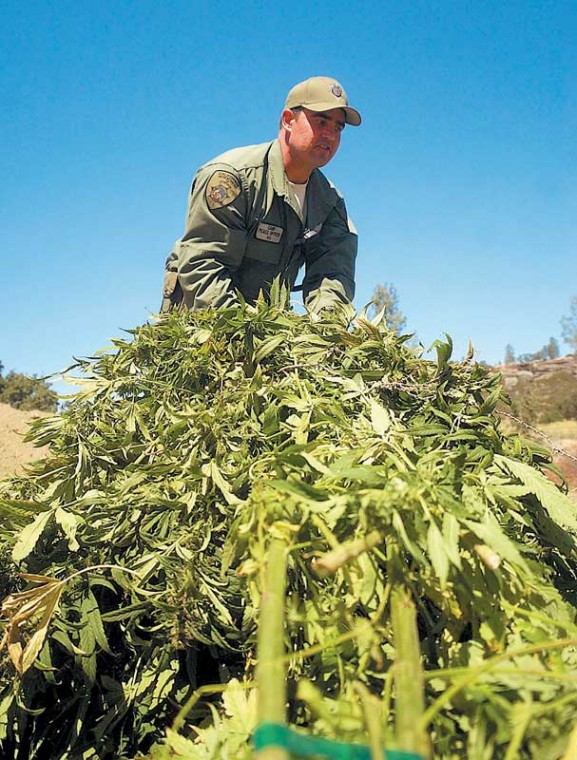Hollister
– With outdoor marijuana growing season starting in the next few
months, local law enforcers are training agents and educating
ranchers in preparation for eradicating the county’s gardens this
summer.
Hollister – With outdoor marijuana growing season starting in the next few months, local law enforcers are training agents and educating ranchers in preparation for eradicating the county’s gardens this summer.
“A lot of this is going to be awareness for people who own property in the rural areas,” San Benito County Sheriff Curtis Hill said.
Much of the county’s marijuana crop is cultivated on public land, owned by the Bureau of Land Management, Hill said. But some growers are shifting to private land.
Authorities are beginning to meet with south San Benito County ranch owners Thursday to teach them how to spot and report marijuana gardens growing on their property.
The Unified Narcotics Enforcement Team, made up of law enforcement personnel from Santa Clara and San Benito counties, works with the BLM and private landowners to combat marijuana growing, UNET Cmdr. Mark Colla said.
“If it’s on private land we might need a search warrant or permission from the owner,” Colla said.
Most of the gardens are operated by Mexican drug cartels, Hill said. At $4,000 per plant, marijuana growing remains a profitable business, especially in rural counties.
In 2006, UNET confiscated 56,363 marijuana plants, and made 14 arrests in San Benito County, the most since 1999, when agents seized more than 90,000 plants, Colla said.
Finding the gardens can take extraordinary measures.
Agents often use helicopters to not only find gardens, which are often located in the most rural and inaccessible parts of the county, but also to seize the plants and make arrests, Hill said. Authorities also use information obtained from previous marijuana-related arrests.
The sheriff’s office will soon send up to six deputies to helicopter school to learn special tactics, Hill said. Tactics include conducting landings and rappelling from the helicopter into gardens.
“We’ve been gearing up and getting all of the training done,” Hill said.
Hill recently re-signed an agreement with the Campaign Against Marijuana Planting, a state run multi-agency organization.
Larger busts often require more manpower than is available locally, Hill said. But CAMP provides training and manpower to local agencies to aid in marijuana abatement.
“We can get 30 to 40 people if we want depending on the situation,” he said.
In 1999, authorities made the biggest pot bust in county history.
Officials confiscated more than 84,000 plants with a street value of $330 million, Hill said. The county’s total legal agricultural crop in 2005 was valued at $268 million, according to the San Benito County Agricultural Commissioner.
It took agents almost two weeks to eradicate the 84,000 pot plants, Hill said.
Michael Van Cassell covers public safety for the Free Lance. He can be reached at 831-637-5566 ext. 335 or mv*********@***********ws.com.









